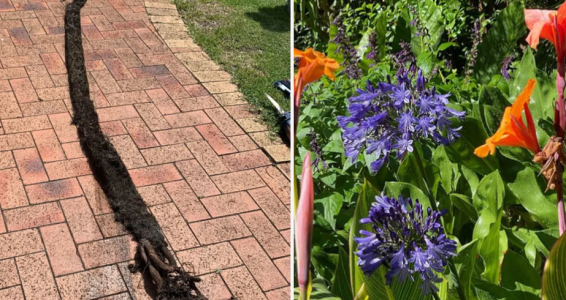Invasive species could be draining your wallet; experts advise immediate action
By
Gian T
- Replies 5
A well-kept garden is not only a source of pride and joy but can also significantly increase the value of your home.
However, it's not just about keeping the lawn mowed and the hedges trimmed.
The plants you nurture in your backyard could substantially impact your property's worth, especially if you're considering putting it on the market.
Recent research has highlighted a green thumb caution: while they may seem harmless or aesthetically pleasing, certain plants could silently reduce your home's value.
Poorly manicured gardens with the wrong types of plants could lower a home's worth by a staggering 30 per cent.
Property expert Shaun McGowan has shed light on this leafy issue.
He advised homeowners to be particularly wary of invasive species that can cause structural damage to walls, drains, and foundations.
'With plants like weeping figs and ivy, which can cause costly structural damage, homeowners should seriously consider removing these invasive species if they’re planning to sell,' he said.
So, which plants should you be wary of? Here are the five main species considered the biggest threat to Australian home prices:
Weeping Figs, despite their popularity, these trees have invasive root systems that can infiltrate pavements, underground drains, sewage systems, and even swimming pools.
Agapanthus are found nationwide; this plant can spread rapidly via its purple flower, which can self-reproduce.
Palms add a tropical ambience to a garden. Their root systems can be damaging as they grow, potentially invading walls, foundations, and pavements.
Recognised as a severe environmental threat in several states, ivy is an aggressive invader that can cause damage within just one or two years, even toppling large trees.
The cost of professional removal of these plants can run into the thousands.
Still, McGowan warns that leaving these species unchecked may lead to repair costs that far exceed the expense of professional removal.
'Plants like these not only threaten property value but can lead to repair costs that far exceed the expense of professional removal,' he said.
Addressing these issues proactively can help homeowners preserve their property's value and avoid unforeseen costs.
It's not all doom and gloom, though. Good landscaping can add up to 28 per cent to a home's overall value.
Conversely, a neglected garden could lower a property's value by 5-15 per cent, with some real estate agents believing the effect could be even higher.
 Have you had any experiences with invasive plants affecting your property? Or have you seen a boost in property value after a landscaping makeover? Feel free to share your stories with us in the comments below.
Have you had any experiences with invasive plants affecting your property? Or have you seen a boost in property value after a landscaping makeover? Feel free to share your stories with us in the comments below.
However, it's not just about keeping the lawn mowed and the hedges trimmed.
The plants you nurture in your backyard could substantially impact your property's worth, especially if you're considering putting it on the market.
Recent research has highlighted a green thumb caution: while they may seem harmless or aesthetically pleasing, certain plants could silently reduce your home's value.
Poorly manicured gardens with the wrong types of plants could lower a home's worth by a staggering 30 per cent.
Property expert Shaun McGowan has shed light on this leafy issue.
He advised homeowners to be particularly wary of invasive species that can cause structural damage to walls, drains, and foundations.
'With plants like weeping figs and ivy, which can cause costly structural damage, homeowners should seriously consider removing these invasive species if they’re planning to sell,' he said.
So, which plants should you be wary of? Here are the five main species considered the biggest threat to Australian home prices:
Weeping Figs, despite their popularity, these trees have invasive root systems that can infiltrate pavements, underground drains, sewage systems, and even swimming pools.
Agapanthus are found nationwide; this plant can spread rapidly via its purple flower, which can self-reproduce.
Palms add a tropical ambience to a garden. Their root systems can be damaging as they grow, potentially invading walls, foundations, and pavements.
Recognised as a severe environmental threat in several states, ivy is an aggressive invader that can cause damage within just one or two years, even toppling large trees.
The cost of professional removal of these plants can run into the thousands.
Still, McGowan warns that leaving these species unchecked may lead to repair costs that far exceed the expense of professional removal.
'Plants like these not only threaten property value but can lead to repair costs that far exceed the expense of professional removal,' he said.
Addressing these issues proactively can help homeowners preserve their property's value and avoid unforeseen costs.
It's not all doom and gloom, though. Good landscaping can add up to 28 per cent to a home's overall value.
Conversely, a neglected garden could lower a property's value by 5-15 per cent, with some real estate agents believing the effect could be even higher.
Key Takeaways
- Australians are warned that having certain types of plants in their garden can decrease property value by up to 30 per cent.
- Property expert Shaun McGowan advised homeowners to remove invasive plant species, like weeping figs and ivy, to avoid damaging structures and maintain property value.
- Five main plant types are identified as risks to Australian home prices due to their invasive nature and potential for causing structural damage.
- Good landscaping can increase a home's value by up to 28 per cent, while neglected gardens could lower it by 5-15 per cent, with the possibility of an even greater decrease.








